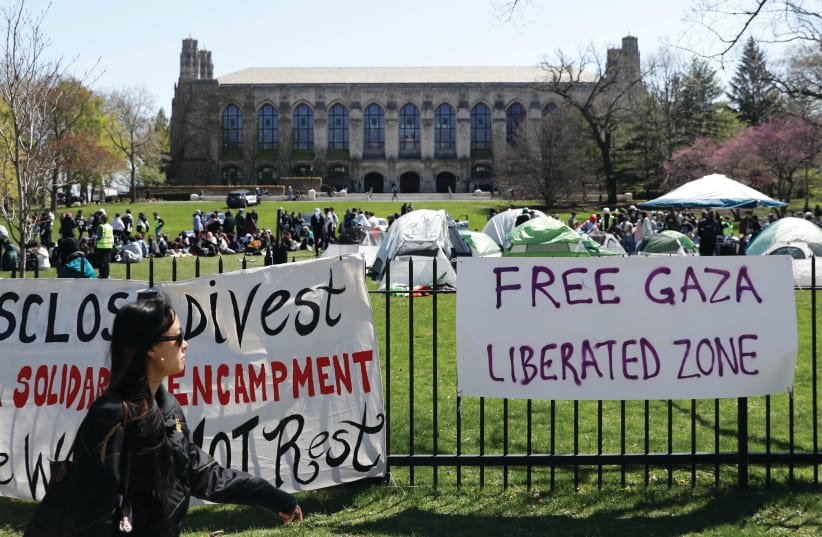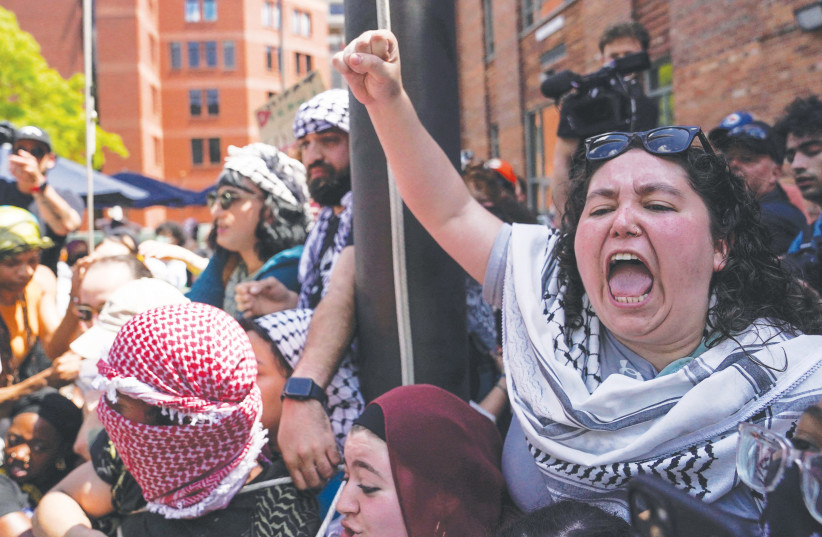As New York police surrounded Columbia University’s Hamilton Hall and prepared to breach, encamped students ensnared in a trap of their design cried out to be allowed to go home and get ready for finals. While many expected heavy resistance to arrest, or a struggle, police were primarily met with individuals oblivious to the concept that actions have consequences.
The scene illustrates a duality of protesters throughout universities. We are witnessing students who want all the notoriety of protesters but have zero grasp that they are participating in the real world. It begs the question: who is putting them up to this?
These violent protests exhibit traits suggesting an outside force is using them as pawns. While I enjoy the concept of an Outdoor World salesman making the deal of a lifetime of hundreds of green and white tents, this is not a new wave of avid campers. Each encampment is ready to distribute branded materials and suddenly knows how to build a defensive perimeter. I spent years working in youth organizing, all aspects of which point to training and a parent organization assisting.
Who is behind this?
Suspicions of outside forces are compounded when looking at the arrests. In several cases, non-students comprise a third to half of arrested antagonists. At Columbia, family members of known terrorists joined the encampment to meet with the occupiers. Students are being duped into promoting an astroturfed movement based on violence against Jews, taking the fall for shadow operators.
Who is funding these encampments? We can comfortably assume the same forces prop up Boycott, Divestment, and Sanctions debates across academia. Each university that falls victim to these flash protests is immediately met with a list of “demands” if they want the encampment disbanded. Most universities have rejected negotiating with trespassers, but institutions like Northwestern University have caved to the mob.
Items on the table include housing and scholarships for “Palestinian” students, along with the removal of Israeli hummus from cafeterias. The University of Chicago assailants want employment guarantees for “scholars” that meet their criteria, even if they want to discuss vacating the premises. Brown University reached an agreement with the Brown Divest Coalition to hold a vote on divesting from Israel.
Seeing universities barter with such actors as legitimate partners is insulting enough. Still, it reaches new heights of absurdity when you remember swaths of the encampments are not students.
COLLEGIATE INSTITUTES are obligated not to reward those who trample on the freedom of tuition-paying students. The Board of Regents’s code of conduct must be enforced and properly executed. I am proud that my alma mater, Arizona State University, is not budging on the suspension and barring of arrested violators from campus grounds. While I would recommend harsher action, tanking their ability to finish the semester is a fine place to start.
Anyone who calls for violence against their fellow students or communities should be expelled and barred from assistance in transferring academic credits. Private universities should allow police to clear out these mobs. Students go to college to have their ideas, not their existence, challenged.
Victims of the mob should follow the lead of students at Columbia who have filed a class-action lawsuit against the university for allowing their rights and safety to be threatened. Governments must also investigate actions such as the “Zionist checkpoints” installed at the University of California Los Angeles – a flashback to the Nazi brigades that blocked access to Jews in Vienna.
In the late 1920s, after finishing his medical training at Cornell University, my grandfather studied pathology in Austria. Brownshirts had risen to prominence in German society, and Hitler’s rise was in motion. My grandfather pleaded with his professors and colleagues to leave Austria before it was too late. He was told these things should pass – sure, things are bad, but it is only a fringe movement.
My grandfather would later spend the next two decades of his life checking ship manifests in New York papers for the names of his professors and colleagues. He would never hear from them again.
We must all refuse to sit by and allow history to repeat itself. To anyone who believes they can wait this out, the mobs will come for you, Jewish or not. To the Jews who think hiding your identity will save you, all you are doing is attempting to be taken last.
Calling out evil as it rises is how we prevent its domination. Getting to the core of who is setting our campuses ablaze is a step closer to ending this saga before it is too late.
The writer was granted the American Israel Public Affairs Committee Activist of the Year Award in 2019 & 2020. He is an Arizona State University - Watts College of Public Service master of public policy graduate.

